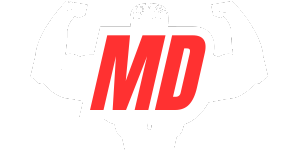You might be making nutritional mistakes that are sabotaging your muscle gains. From protein shortages to calorie deficits, these common errors can prevent progress despite consistent training. Maybe your diet is causing the plateau or lack of growth you want.
Understanding these nutritional pitfalls doesn’t just optimize your gym performance. It transforms your entire approach to building the physique you’re working so hard to achieve.
Inadequate Protein Intake
The cornerstone of muscle development is protein, yet it’s where many lifters make their first critical mistake. Despite hitting the gym consistently, you’re likely sabotaging results if you’re consuming less than 1.6-2.2g of protein per kilogram of bodyweight. This inadequate protein intake prevents ideal muscle repair and growth.
Quality matters as much as quantity. Relying on incomplete protein sources without all essential amino acids limits your body’s ability to synthesize new muscle tissue. Meanwhile, post-workout nutrition represents a critical window that many neglect. Skipping protein within 30-60 minutes after training means missing prime recovery opportunity when your muscles are most receptive to nutrients.
Your dedication in the gym deserves proper nutritional support. Ensure you’re not undermining progress by falling short on this fundamental building block.

Eating Below Maintenance Calories
Though protein quality is extremely important, even perfect amino acid profiles won’t build muscle if you consistently eat below-maintenance calories. You need this caloric surplus to fuel muscle synthesis, repair damaged tissue, and support hormonal functions necessary for growth.
Undereating is surprisingly common among lifters who fear gaining fat alongside muscle. You might be meticulously tracking workouts while unknowingly shorting yourself 300-500 calories daily. This calorie shortage puts survival before the formation of new tissue.
If you’re training hard but seeing minimal gains, track your intake honestly for a week. Many find they’re consuming considerably less than needed. Building muscle takes more fuel than maintenance requires.

Ignoring Nutrient Timing
Nutrient timing represents the next level of nutritional strategy once you’ve mastered calorie and protein intake. Many lifters overlook how meal spacing affects their gains, leaving potential muscle growth on the table.
When you go 5+ hours between meals, you’re missing opportunities to stimulate protein synthesis. Your post-workout nutrition deserves special attention. Consuming carbs and protein within 45 minutes of training replenishes glycogen and jumpstarts recovery when your muscles are most receptive.
Don’t neglect pre-workout nutrition either. Training fasted might work for fat loss, but it compromises performance during hypertrophy-focused sessions. A balanced meal 1-2 hours before lifting provides the energy to push through intense sets, ultimately determining how much stimulus your muscles receive.
Poor Macronutrient Balance
Most bodybuilders obsess over protein intake but neglect other macronutrients that help muscle growth. Cutting carbs that fuel intense workouts and increasing insulin levels will sabotage your gains.
Similarly, dietary fats aren’t just calorie fillers; they’re essential for hormone production, including testosterone that directly influences your ability to build lean mass. When you consistently underconsume fats, particularly saturated and monounsaturated varieties, your endocrine system suffers.
The solution isn’t complicated. Aim for a balanced approach with adequate protein (0.8-1g per pound of bodyweight), sufficient carbs (2-3g per pound) for performance, and healthy fats (0.3-0.5g per pound) for hormonal health.
Neglecting Micronutrients and Hydration
Beyond macronutrients, the often overlooked micronutrients and hydration status can make or break your muscle-building progress. Deficits in key minerals like zinc, magnesium, and vitamin D impair recovery and prevent muscle tissue from repairing itself.
Micronutrient deficiencies often manifest as unexplained fatigue, reduced strength, and persistent soreness. These are the symptoms many lifters mistakenly attribute to overtraining.
Meanwhile, even mild dehydration can decrease performance by 10-20% during your workouts.
Variety is good for your diet. Having the same meals every day may hit your protein targets but leave gaps in your micronutrient profile. Colourful vegetables, varied protein sources, and consistent hydration throughout the day will promote maximum muscle growth.
Misusing or Overrelying on Supplements
Supplement marketing creates unrealistic expectations for muscle-building potential, so lifters often choose pills and powders over real nutrition. This misconception can hinder your progress when supplements replace nutrient-rich whole foods that provide all the vitamins and minerals your muscles need.
You’re also likely wasting money when overrelying on supplements that promise dramatic results without scientific backing. Even pre-workouts, while effective for energy, can lead to tolerance and adrenal fatigue when overused daily.
Instead, focus on evidence-based supplements like creatine and omega-3s as additions to a solid nutritional foundation. Supplements should complement your diet, not compensate for its shortcomings. The most impressive gains always come from consistently eating real food first.

Frequently Asked Questions
How Does Alcohol Consumption Affect Muscle Protein Synthesis?
Alcohol considerably decreases your muscle protein synthesis by up to 30%. It disrupts hormonal balance, dehydrates you, and impairs nutrient absorption. Even moderate drinking can derail your recovery and growth potential.
Should Nutrition Plans Differ Between Male and Female Lifters?
Yes, your nutrition plans should differ. Women typically need more iron and fewer calories than men, while both should prioritize protein. Women may benefit from different carb timing due to hormonal fluctuations throughout their cycles.
Can Intermittent Fasting Work With a Muscle-Building Program?
Yes, intermittent fasting can work with muscle building, but you’ll need to time your feeding window around workouts, maintain adequate protein intake, and guarantee you’re still consuming enough total calories for growth.
How Do I Adjust My Diet When Hitting a Muscle-Building Plateau?
When hitting a muscle-building plateau, increase your calories by 200-300 daily, boost protein intake to 1g per pound of bodyweight, and cycle carb intake higher on training days. Re-evaluate every 2-3 weeks.
Does Sleep Quality Impact Nutrient Utilization for Muscle Growth?
Yes, sleep quality influences nutrient utilization. You optimize hormone production, protein synthesis, and recovery during deep sleep. Bad sleep habits upset these mechanisms, preventing nutrients from supporting your muscle growth potential.



